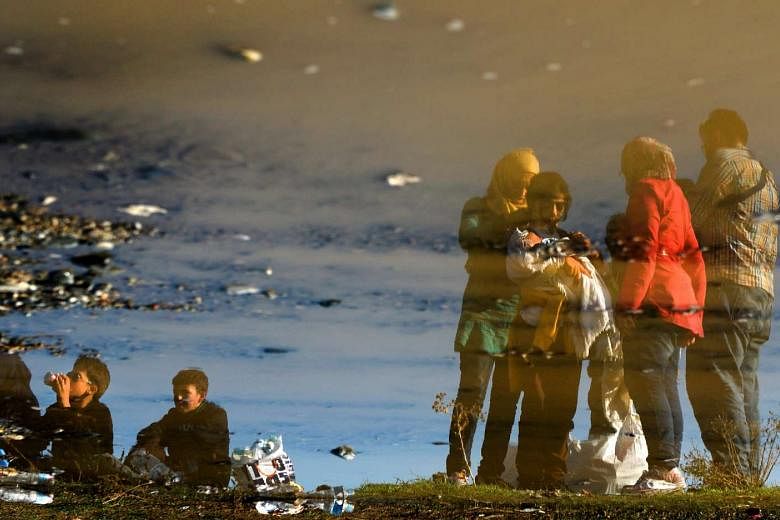BRUSSELS • European Union ministers are considering a watered- down plan to relocate 120,000 refugees throughout the bloc, which drops binding quotas and leaves Hungary out of the scheme, according to sources.
The softer stance emerged on the eve of a new emergency meeting in Brussels of the 28 EU interior ministers, who last week failed to agree on a European Commission (EC) plan for compulsory quotas for refugees fleeing war in Syria, Afghanistan and elsewhere.
"Whether voluntary or mandatory, that is an artificial debate," a source from Luxembourg, which holds the rotating EU presidency, told reporters yesterday, despite EC officials insisting that they still want compulsory quotas.
Another Luxembourg source said the word "mandatory" will not appear in the draft document that will go before the ministers when they meet today to discuss how many refugees each country will take.
Hopes of a unanimous deal last week collapsed in the face of opposition from Hungary, the Czech Republic, Slovakia and Romania, officials said.
With populist parties exploiting anti-immigrant sentiment, many eastern states argued that a Europe-wide relocation plan made little sense for refugees who preferred to settle in wealthier northern and western European nations.
The original plan envisaged quotas for the relocation to other EU states of 54,000 asylum seekers from Hungary, 50,400 from Greece and 15,600 from Italy.
But Hungarian Prime Minister Viktor Orban has insisted that by being included in the plan, his country would be erroneously confirmed as a front-line state for refugee arrivals. He insists that many of the migrants are coming from Greece and should have been registered there first and kept there under EU rules.
"It is established that Hungary will not appear in the draft as a beneficiary country," a Luxembourg source said. "However, it will have to join the solidarity" by hosting refugees from Greece and Italy, the source added.
The figure of 120,000 to be relocated will remain in the draft, but it is not immediately clear which countries will now benefit from the relocation of the 54,000 asylum seekers that were originally earmarked in Hungary, sources said.
One proposal is for Italy and Greece to benefit, while a second is for other countries along the Western Balkans route, such as Croatia and Slovenia, to be given relief.
Despite failing to reach a deal, the EU ministers last week formally approved a plan first aired in May to relocate 40,000 refugees from Greece and Italy.
In a sign of the United States' increasing willingness to help cope with the mass migration of Syrians, US Secretary of State John Kerry said on Sunday that it will increase the number of refugees it takes in by 15,000 over each of the next two years, bringing the total to 100,000 by 2017.
The US move, announced after talks in Berlin between Mr Kerry and his German counterpart Frank-Walter Steinmeier, still falls far short of the global demand for resettlement from people who continue to flee turmoil in the Middle East, Africa and Asia.
Mr Kerry did not say how many of the additional refugees would be from Syria but pledged that the US was ready to help. He also announced he will hold talks on the sidelines of the United Nations General Assembly in New York this week on ways to restart negotiations on a political solution to end the armed revolt against the Damascus regime that erupted in 2011.
The war saw Russia - one of the few remaining allies of President Bashar al-Assad - recently sending troops, artillery and aircraft to Syria, sparking fears that Moscow could be preparing to fight alongside Syrian government forces.
Two US officials yesterday said Russia has started flying surveillance missions with drone aircraft in Syria, in what appeared to be Moscow's first military air operations in Syria since staging a rapid build-up at an airfield there.
The officials, who spoke on condition of anonymity, could not say how many drone aircraft were involved in the surveillance missions. The Pentagon declined to comment.
AGENCE FRANCE-PRESSE, REUTERS, NEW YORK TIMES

